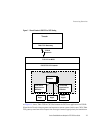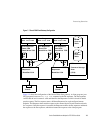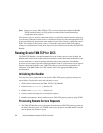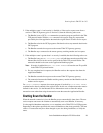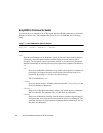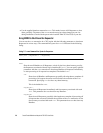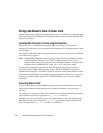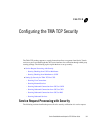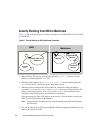Running Oracle TMA TCP for CICS
Oracle Tuxedo Mainframe Adapter for TCP CICS User Guide 2-5
Starting the Requester Program
The Requester is started automatically when the first service request for it is made by a CICS
client program. At that point, the Requester establishes a connection with its remote endpoint and
updates its control tables with run-time information for use by subsequent requests. If the
connection with the remote endpoint is lost for any reason, the Requester attempts to re-establish
the connection automatically. After a configured number of unsuccessful connection attempts,
the Requester marks itself disabled.
If the gateway receives additional service requests, they are accommodated as long as the
maximum multiplex count for the existing connection is not exceeded. Also, additional
connections are opened, as necessary, until the configured maximum connection count is reached
or all requests are accommodated.
Processing TMA TCP for CICS Originated Service Requests
1. The CICS client program (your program) issues an EXEC CICS LINK command to the TMA
TCP for CICS Pre-requester.
2. The Pre-requester verifies that the request is valid, and then determines whether a Requester
has been started for the specific endpoint for which this request is destined. If a Requester is
not already running, the Pre-requester starts one.
3. The request is then handed over to the Requester.
4. The Requester transmits the request information to the remote Oracle Tuxedo domain.
5. If the request is a type that needs a response, the Requester receives that response back from
Oracle Tuxedo, and hands the data over to the Pre-requester.
6. The Pre-requester issues an
EXEC CICS RETURN command to the client program (your
program). The client receives its response in the
COMMAREA.
Shutting Down the Requester
There are two ways to shut down the Requester:
z Use the administrative tool (described in “Configuring and Administering Oracle TMA
TCP for CICS”) to disable the Requester. This method causes the selected Requester to
clean up its tables and shut down gracefully. It also prohibits any service requests invoking
it. When you are ready, use the administrative tool to enable the Requester.



